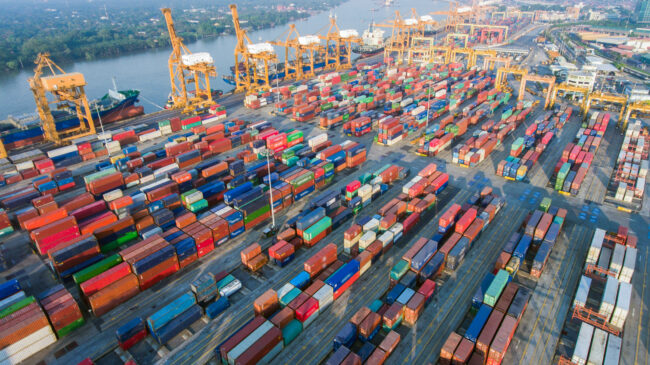Six years after then-President Donald Trump signed the first tariffs and began a costly U.S.-China trade war, it’s become clear that these tariffs are an abject policy and economic failure.
Former President Trump said one of his primary foreign policy goals was to rein in global adversaries like China and take U.S. trade partners to task for growing trade deficits (defined as U.S. imports exceeding exports). Trump’s approach to achieving this goal was enacting tariffs, especially focusing on China. These tariffs have negatively impacted trade between the U.S. and China, leading importers to shift toward Mexico’s west coast instead of shipping directly to the United States. As a result, trade between Mexico and China has grown by 60% in one year.
The Trump tariffs were originally justified by the growing U.S.-Chinese trade deficit and China’s abuse of U.S. intellectual property. Trade deficits occur naturally in the global market when the value of a country’s imports exceeds its exports. These deficits aren’t a serious concern, as they can actually have positive implications for the economy: cheaper goods being imported makes it easier for American consumers to acquire them.
Still, it seems these tariffs have found bipartisan support. President Joe Biden elected to keep them in place and extended some others. Additionally, the tariffs were implemented with a few other goals in mind: Jobs like steelwork were supposed to remain in America, domestic capacity in choice industries in the U.S. was to be safeguarded, and tariffs would supposedly ensure the U.S. had the leverage to renegotiate trade deals across the globe. According to proponents, the tariffs would benefit the average American citizen, who would then buy cheaper products made at home.
But that has not been the reality. The policy goal of creating and safeguarding American jobs has failed. A 2021 study by the U.S.-China Business Council found that the Trump tariffs resulted in an estimated 245,000 American jobs lost. In a recent and politically charged example, U.S. Steel made the first moves to sell the company to the Japan-based Nippon Steel Corporation despite decades of government subsidies.
Put bluntly, this is the market at work. U.S. Steel was offering a product in low volumes and at high prices. The tariffs imposed on steel imports did not erase domestic demand and did little to shore up domestic supply. By removing or reducing cheaper international products through protectionist policies like tariffs, U.S. Steel remained uncompetitive far longer than it would have without the government’s intervention.
But were tariffs truly effective in deterring U.S. imports of Chinese goods? Xenata, one of the leading freight benchmarking and analysis firms, says no. Chinese trade is growing year-over-year, but unprecedented growth has occurred between China and Mexico. Specifically, China’s trade volumes with Mexico have grown from 73,000 TEUs (twenty-foot equivalent units) in January 2023 to 117,000 TEUs in Jan. 2024—a 60% increase, as visualized in Figure 1 below.
Figure 1: China to Mexico West Coast imports growth rate
Source: Peter Sand, “Weekly Container Rate Update | Week 11 ’24 – Intriguing evolution of China trades into Mexico and U.S. west coasts,” Xenata.com, 14 Mar. 2024.
Peter Sand, Xenata’s chief analyst, suggests that this growth is not due to some newfound trade boom between Mexico and China alone. It’s at least in part because many of the goods China is exporting to Mexico are being trucked north to the U.S. In effect, the tariffs have been circumvented with an additional step. In addition to raising prices on U.S. consumers and businesses, this comes with the added costs of higher transportation-related emissions and global supply-chain distortions.
The one policy goal they may have achieved, albeit indirectly and negatively, is the need to renegotiate trade agreements. The necessity for renegotiation doesn’t stem from notable policy achievements but from the unequivocal failure of tariff policies. The only reason the United States has to renegotiate is because of the wedge these tariffs have driven between the U.S. and its trade partners. Even if proponents of tariffs were to support the imposition of further trade barriers on Mexico to stem Chinese imports, these evasion and avoidance tactics are likely to merely shift elsewhere, as well as invite retaliation against U.S. exporters.
As the Cato Institute’s Scott Lincicome noted in 2018, “Tariffs not only impose immense economic costs on consumers but also fail to achieve their primary policy aims and foster political dysfunction along the way.”
However, these tariffs can serve as a lesson for President Biden now and whoever wins the 2024 presidential election; instead of extending these failed tariffs and trade policies, they ought to be repealed.

